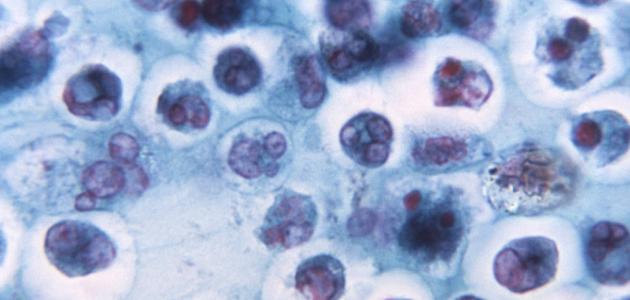Overview
Immunodeficiency disorders are represented by a decrease in the immune response of the body, which may affect any of the parts of the immune system, and to understand this better, it must be stated that the immune system in the normal situation protects the body from harmful substances known as antigens (in English: Antigens), including bacteria, viruses, toxins, and cancer cells, in addition to blood or tissues transferred from another person. T cell, or B lymphocytes known as B cells, or both types because they function normally or because the body does not produce enough antibodies (in English: Antibodies).
Speaking about the causes of immunodeficiency, it can be said that it is divided into two types, primary and secondary. Primary immunodeficiency diseases (PIDD) are a group of disorders resulting from genetic or genetic defects in the cells and tissues of the immune system. As for immunodeficiency disease Secondary immune deficiency disease occurs when the immune system is compromised by an environmental factor, including human immunodeficiency virus (HIV), chemotherapy, severe burns, or malnutrition.
Read also:What are the causes of unconsciousnessCauses of immunodeficiency
Secondary immunodeficiency
It should be noted that secondary immunodeficiency disease is more common than primary immunodeficiency diseases, and there are many different causes attributed to the occurrence of secondary immunodeficiency, and they can be explained in some detail as follows:
Malnutrition
A series of studies published in the Journal of Venomous Animals and Toxins including Tropical Diseases in 2009 indicated that the biological function of various types of cells is clearly reduced when a deficiency or malnutrition is caused by a lack of energy or a deficiency of micronutrients (in English: Micronutrient deficiency). ) in the body, which includes both vitamins and minerals, and to understand the mechanism of the effect of malnutrition on immunity, it is worth addressing what is known as the complement system, which can destroy bacteria or viruses present in the body, through each of the phagocytic cells ( In English: Phagocyte) and complement components, which are proteins that help immune cells to kill bacteria and contribute to recognizing foreign cells in preparation for their destruction. Thus, it can be concluded that malnutrition will affect the presence and functions of phagocytes and complement components, and this effect will result in directly to eliminate pathogens.
getting old
The susceptibility to infection, cancer, and autoimmune disorders increases with the advancing age of the immune system and the decline of its capabilities, and given that the field of research based on studying the effect of age-related changes in immune function is still a relatively new field, the understanding of the mechanisms of occurrence of these disorders and immune complexes is still lacking. .
Read also:Symptoms of arthritissome types of medication
There are many medications that may affect the immune system, which can be described as follows:
- Medicines that target the immune system, such as immunosuppressant drugs, and biologics, in addition to chemotherapy, and these drugs may be used to treat several conditions such as: leukemia and lymph nodes In particular, as well as other medical conditions such as rheumatoid arthritis, multiple sclerosis, inflammatory bowel disease and psoriasis.
- Medicines known to cause specific complications in the immune system, for example, some anti-epileptic drugs can cause a deficiency of antibodies in the body, and it is worth noting that these effects are not related to the way the medicines work.
infection
Infections including influenza, infectious mononucleosis, and measles are among the reasons that may weaken the immune system for a short time, but there are some types of chronic infections that may cause infection Secondary immunodeficiency disorders, the most common of which is acquired immune deficiency syndrome (AIDs), caused by infection with the human immunodeficiency virus (HIV).
Speaking of the link between AIDS and the immune system, it can be said that this virus attacks a type of T cell called Cluster of Differentiation 4 (CD4), which is a type of white blood cell that It plays an important role in preventing infection, and as a result of the virus attacking these cells, their numbers gradually decline, and as soon as the number of T cells becomes less than 4 cells / milliliter of blood, the symptoms of AIDS begin to appear, and thus the patient is at risk of recurrent infections that lead to The end to death.
Read also:Causes of body tremorsome types of cancer
Bone marrow produces blood cells that help fight infection and respond to it, and in cases of cancer, this may lead to a weakening of the immune system in the patient’s body when it spreads to the bone marrow, so that this prevents the bone marrow from forming many blood cells, and although This often occurs in cases of leukemia, leukemia, or lymphoma, but it can occur in cases of other types of cancer as well.
Splenectomy
The spleen is located in the upper left side of the abdomen, and is part of the immune system in the body, and its function lies in helping to protect the body from infection, as it consists of special cells that kill bacteria if they are present in the blood while it passes through the spleen, and due to Because other parts of the immune system protect the body from most types of bacteria, viruses, and other germs, most infections can be dealt with without the need for the spleen. post-splenectomy infection) and OPSI increases in individuals who do not have a spleen; And this is in some cases in which it is resorted to to remove it for various reasons, such as the spleen being infected with a disease or damage due to an injury, and on the other hand, the risk of infection with this infection may also be high in individuals whose spleen does not work efficiently due to the occurrence of certain diseases that may affect the efficiency of its work, Examples include: sickle cell disease, thalassemia, and lymphomas.
chronic diseases
Immunodeficiency disorders may occur as a result of a long-term chronic disease. For example, diabetes can lead to an immunodeficiency disorder, because the efficiency of white blood cells is affected as a result of the high level of sugar in the blood.
pregnancy
The role of the immune system, including its strength or weakness in the mother during pregnancy, is precisely determined to achieve the best results for both mother and child. To understand this, it is worth noting that the immune system during the first 12 weeks of pregnancy is alert; This is to allow the formation of the basic structure of the fetus in full, as it has been concluded that an aggressive immune system response is necessary for the implantation of the fetus in the uterus, and in fact immune cells flow into the lining of the uterus and cause inflammation to arrange the process of implantation of the fetus successfully, and scientists believe that the immune system of the pregnant woman must be suppressed throughout the rest of the pregnancy to prevent it from rejecting the fetus, for the next 15 weeks the mother's immune system is suppressed to allow the fetus's cells to grow and develop.
Primary immunodeficiency
Primary immunodeficiency diseases are represented by a group of disorders that may reach more than 400 rare chronic disorders, and these disorders may differ between them, but they share one feature represented by the fact that each of them results from a defect in one of the functions of the body’s natural immune system, as there is a defect In the efficient functioning of the immune system in the body, or one of its parts is missing, and what should be noted is that these disorders are not contagious, but some of them may be congenital; That is, present from birth or from early childhood, and it can affect any person regardless of his age or gender, and its occurrence may be attributed to the presence of genetic defects transmitted from one or both parents, or to the presence of genetic defects resulting from problems in the code Genetic disorders known as deoxyribonucleic acid (DNA), which cause many defects in the immune system. It should be noted that some of these disorders affect one part of the immune system, while others may affect the immune system. One or more of its parts, which can be broadly classified into six groups based on which part of the immune system is affected as follows:
- B cell deficiency (antibodies).
- T cell deficiency.
- Deficiency of both B and T cells.
- phagocytopenia.
- Complement deficiency or complement deficiency.
- Idiopathic disorders.
It should be noted that it was found that there is a single risk factor for primary immunodeficiency disorder, which is the presence of a family history of this disorder, which increases the risk of developing it, so it should be noted that it is recommended to seek medical advice when planning to start a family if the individual has some kind of Primary immunodeficiency disorder.
Factors affecting immunity
There are many factors that affect immunity in a negative way, the most prominent of which can be mentioned as follows:
- alcoholism.
- smoking.
- Unhealthy eating habits.
- lethargy physical activity
- Undergoing previous surgery.
- trauma.
- Surrounding environmental conditions, such as: ultraviolet light, radiation, hypoxia, and space travel.
- Having genetic syndromes, such as Down syndrome.









